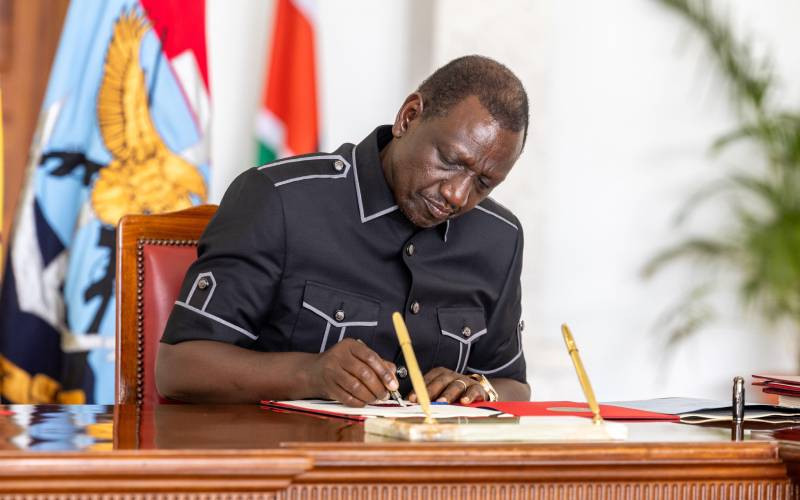Reading autobiographies is always exciting as one gets to hear the real story from the horse’s mouth, so to speak.
When the autobiography is that of a public figure, such as a politician, the reader’s curiosity gets aroused.
Considering Kenyans’ penchant for defining themselves, and their leaders, as belonging to specific ethnic communities, the publication of the life narrative of a ‘Kenyan’ politician who does not ‘belong’ to some Kenyan tribe is definitely a worthy story.
Joe Khamisi’s autobiography, Dash Before Dusk (East African Educational Publishers, 2014) is one such story. Born in 1943, Joseph Matano Khamisi is a descendant of slaves from Nyasaland, present day Malawi, who were rescued by the British from a slave ship in the Indian Ocean and settled in Rabai by the Church Missionary Society (CMS) mission in Kenya.
The mission was started in 1844 by two German missionaries, Rev Ludwig Krapf and Johannes Rebmann, and became the home for thousands of rescued slaves.
Khamisi’s grandparents had been among many slaves settled around the mission in the late 1880s when the Sultan of Zanzibar issued letters of freedom to former slaves. To read his story is therefore to read part of the history of slavery and slave trade along the East African coast.
The slave identity is one Khamisi would carry with him all his life since local communities at the Coast did not fully embrace the former slaves though they settled among them.
Political evils
Dash before Dusk recollects Kenya’s political history from the colonial times through the struggle for independence to the present.
Khamisi’s father, Francis Khamisi, was a politician and Joe was therefore introduced to politics early in his life.
The elder Khamisi was among founder members of Kenya African Study Union (Kasu) together with, among others, James Gichuru and J. D. Otiende and was Secretary General of the Kenya African Union (KAU) when it was formed in 1944 to replace Kasu after the leaders realised the latter was not the right vehicle to take Africans to self-rule.
Just like his father, Joe joined the civil service and politics and the book therefore tells his story as a civil servant and a politician.
In 1946, Francis was nominated to the Nairobi Municipal Council as a councillor and the narration of this period in Joe’s life allows him to indict political leaders for tribalism and to note that the evil has been part of the Kenyan political psyche for a long time.
Before the expiry of Francis’ term at the Nairobi Municipal Council, he was invited to India as a guest of the Kenya National Indian Congress and to translate the biography of Mahatma Gandhi into Kiswahili.
Unfortunately, when Jomo Kenyatta, who had recently returned from London and taken charge of KAU, heard about the journey, he “objected to Khamisi’s selection and instead recommended that James Beauttah, a fellow Kikuyu, proceed to India.”
Stay informed. Subscribe to our newsletter
The act may have seemed harmless then but its weight is not lost on the reader who senses bitterness in Khamisi and an implicit doubt of the integrity of Kenya’s early political leadership. Francis would later, in 1958, be elected to represent the Coast region in the Legislative Council (LegCo) alongside Ronald Ngala.
Khamisi’s book tells the story of Kenya’s post-colonial life and reflects on what could have been. It calls to attention the fact that contemporary debates about high corruption among politicians and bureaucrats are not new; they are a carry-over from the first republic.
In a sense, he demonstrates that the reasons for Kenya’s underdevelopment are based on the parasitic nature of the post-colonial state.
He outlines some iniquities of powerful individuals in the first and second republics including smuggling of charcoal to Saudi Arabia, trading of cloves from Zanzibar on the black market, illegal exports of maize and rice to Uganda aboard oil tankers and poaching to meet the needs of illegal ivory trade.
Kanu mouthpiece
He narrates his experiences while working in the Ministry of Tourism and Wildlife and notes that government officials were involved in poaching. As an information officer in the ministry, he confesses that he had to defend the government position regarding the massive poaching hurting Kenya’s image abroad, although he knew that people related to powerful politicians were involved in the vice.
His expose clearly demonstrates that today’s tourism and poaching crises have their roots in greedy officials of successive regimes.
Having worked at the Voice of Kenya, the state broadcaster, now Kenya Broadcasting Corporation (KBC) for many years, Khamisi uses his autobiography to reveal the political manipulation of the VoK to skew news in favour of Government.
He recalls the fall-out between Kenyatta and Oginga Odinga and notes that the VoK was “under strict instructions to support Kanu’s position and demonise Odinga.”
In another example of VoK’s questionable integrity, he further notes, the station was skewed in its reporting of the shifta war in North-Eastern when then Permanent Secretary for Defence instructed that all war reports be cleared by his office.
Such revelations explain why citizens are often wary of information from state broadcasters as it is not in doubt that the Government of the day can manipulate such organisations to the disadvantage of citizens.
Dash before Dusk also recalls the excesses of the Kanu regime such as forcing of civil servants to be Kanu party members.
He retells the narrative of corruption and human rights abuses during this period and explains that he was once threatened by a senior Kanu official who accused him of trying to destroy the regime through his political write-ups in international newspapers.
Shameful culture
It was perhaps this narrative that he wished to change when he joined Parliament in 2002 as MP for Bahari constituency.
He expresses his disappointment with President Kibaki for failing to fight corruption. Khamisi’s story proves greed is the foundation of all that ails Kenya and highlights corruption, tribalism, ignorance, lack of patriotism and disunity as some of our undoing.
After reading the book no one would disagree with him that qualities of good leadership; humility, tolerance, honesty, integrity, competence, fairness, patriotism and volunteerism do not matter in Kenyan politics.
Nepotism and corruption have disenfranchised majority of Kenyans but voters are also to blame for their greed. He decries Kenya’s lack of shame and insists the media are culpable too.
With the current news about corruption, one joins Khamisi in wondering loudly if the Government is genuine about its commitment to ending corruption.
The writer teaches Literature at the University of Nairobi.
[email protected]
 The Standard Group Plc is a
multi-media organization with investments in media platforms spanning newspaper
print operations, television, radio broadcasting, digital and online services. The
Standard Group is recognized as a leading multi-media house in Kenya with a key
influence in matters of national and international interest.
The Standard Group Plc is a
multi-media organization with investments in media platforms spanning newspaper
print operations, television, radio broadcasting, digital and online services. The
Standard Group is recognized as a leading multi-media house in Kenya with a key
influence in matters of national and international interest.
 The Standard Group Plc is a
multi-media organization with investments in media platforms spanning newspaper
print operations, television, radio broadcasting, digital and online services. The
Standard Group is recognized as a leading multi-media house in Kenya with a key
influence in matters of national and international interest.
The Standard Group Plc is a
multi-media organization with investments in media platforms spanning newspaper
print operations, television, radio broadcasting, digital and online services. The
Standard Group is recognized as a leading multi-media house in Kenya with a key
influence in matters of national and international interest.







